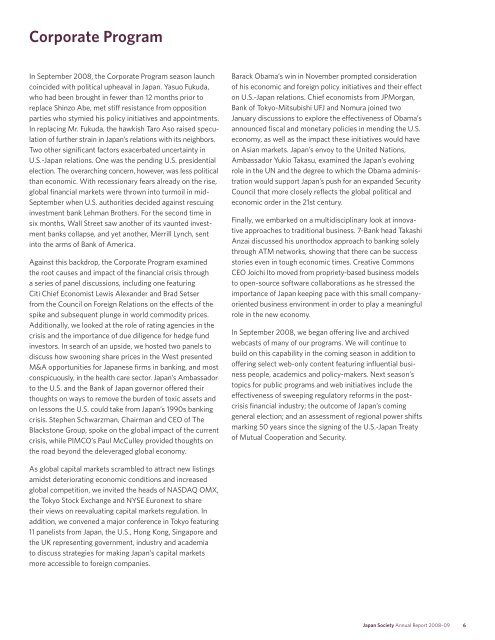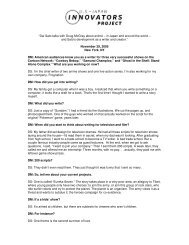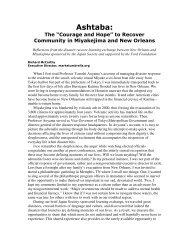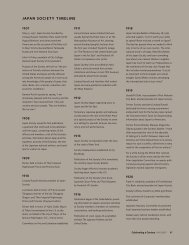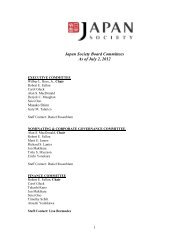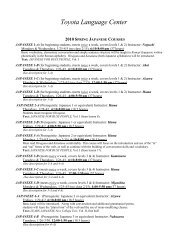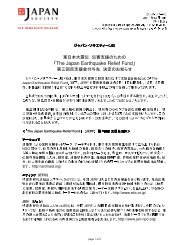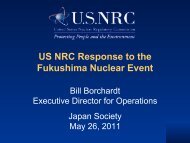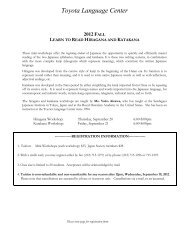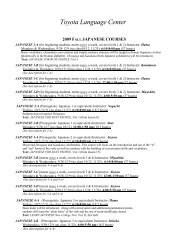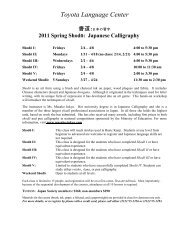Programs (PDF) - Japan Society Annual Report 2008â09 1
Programs (PDF) - Japan Society Annual Report 2008â09 1
Programs (PDF) - Japan Society Annual Report 2008â09 1
Create successful ePaper yourself
Turn your PDF publications into a flip-book with our unique Google optimized e-Paper software.
Corporate Program<br />
In September 2008, the Corporate Program season launch<br />
coincided with political upheaval in <strong>Japan</strong>. Yasuo Fukuda,<br />
who had been brought in fewer than 12 months prior to<br />
replace Shinzo Abe, met stiff resistance from opposition<br />
parties who stymied his policy initiatives and appointments.<br />
In replacing Mr. Fukuda, the hawkish Taro Aso raised speculation<br />
of further strain in <strong>Japan</strong>’s relations with its neighbors.<br />
Two other significant factors exacerbated uncertainty in<br />
U.S.-<strong>Japan</strong> relations. One was the pending U.S. presidential<br />
election. The overarching concern, however, was less political<br />
than economic. With recessionary fears already on the rise,<br />
global financial markets were thrown into turmoil in mid-<br />
September when U.S. authorities decided against rescuing<br />
investment bank Lehman Brothers. For the second time in<br />
six months, Wall Street saw another of its vaunted investment<br />
banks collapse, and yet another, Merrill Lynch, sent<br />
into the arms of Bank of America.<br />
Against this backdrop, the Corporate Program examined<br />
the root causes and impact of the financial crisis through<br />
a series of panel discussions, including one featuring<br />
Citi Chief Economist Lewis Alexander and Brad Setser<br />
from the Council on Foreign Relations on the effects of the<br />
spike and subsequent plunge in world commodity prices.<br />
Additionally, we looked at the role of rating agencies in the<br />
crisis and the importance of due diligence for hedge fund<br />
investors. In search of an upside, we hosted two panels to<br />
discuss how swooning share prices in the West presented<br />
M&A opportunities for <strong>Japan</strong>ese firms in banking, and most<br />
conspicuously, in the health care sector. <strong>Japan</strong>’s Ambassador<br />
to the U.S. and the Bank of <strong>Japan</strong> governor offered their<br />
thoughts on ways to remove the burden of toxic assets and<br />
on lessons the U.S. could take from <strong>Japan</strong>’s 1990s banking<br />
crisis. Stephen Schwarzman, Chairman and CEO of The<br />
Blackstone Group, spoke on the global impact of the current<br />
crisis, while PIMCO’s Paul McCulley provided thoughts on<br />
the road beyond the deleveraged global economy.<br />
Barack Obama’s win in November prompted consideration<br />
of his economic and foreign policy initiatives and their effect<br />
on U.S.-<strong>Japan</strong> relations. Chief economists from JPMorgan,<br />
Bank of Tokyo-Mitsubishi UFJ and Nomura joined two<br />
January discussions to explore the effectiveness of Obama’s<br />
announced fiscal and monetary policies in mending the U.S.<br />
economy, as well as the impact these initiatives would have<br />
on Asian markets. <strong>Japan</strong>’s envoy to the United Nations,<br />
Ambassador Yukio Takasu, examined the <strong>Japan</strong>’s evolving<br />
role in the UN and the degree to which the Obama administration<br />
would support <strong>Japan</strong>’s push for an expanded Security<br />
Council that more closely reflects the global political and<br />
economic order in the 21st century.<br />
Finally, we embarked on a multidisciplinary look at innovative<br />
approaches to traditional business. 7-Bank head Takashi<br />
Anzai discussed his unorthodox approach to banking solely<br />
through ATM networks, showing that there can be success<br />
stories even in tough economic times. Creative Commons<br />
CEO Joichi Ito moved from propriety-based business models<br />
to open-source software collaborations as he stressed the<br />
importance of <strong>Japan</strong> keeping pace with this small companyoriented<br />
business environment in order to play a meaningful<br />
role in the new economy.<br />
In September 2008, we began offering live and archived<br />
webcasts of many of our programs. We will continue to<br />
build on this capability in the coming season in addition to<br />
offering select web-only content featuring influential business<br />
people, academics and policy-makers. Next season’s<br />
topics for public programs and web initiatives include the<br />
effectiveness of sweeping regulatory reforms in the postcrisis<br />
financial industry; the outcome of <strong>Japan</strong>’s coming<br />
general election; and an assessment of regional power shifts<br />
marking 50 years since the signing of the U.S.-<strong>Japan</strong> Treaty<br />
of Mutual Cooperation and Security.<br />
As global capital markets scrambled to attract new listings<br />
amidst deteriorating economic conditions and increased<br />
global competition, we invited the heads of NASDAQ OMX,<br />
the Tokyo Stock Exchange and NYSE Euronext to share<br />
their views on reevaluating capital markets regulation. In<br />
addition, we convened a major conference in Tokyo featuring<br />
11 panelists from <strong>Japan</strong>, the U.S., Hong Kong, Singapore and<br />
the UK representing government, industry and academia<br />
to discuss strategies for making <strong>Japan</strong>’s capital markets<br />
more accessible to foreign companies.<br />
<strong>Japan</strong> <strong>Society</strong> <strong>Annual</strong> <strong>Report</strong> 2008–09 6


